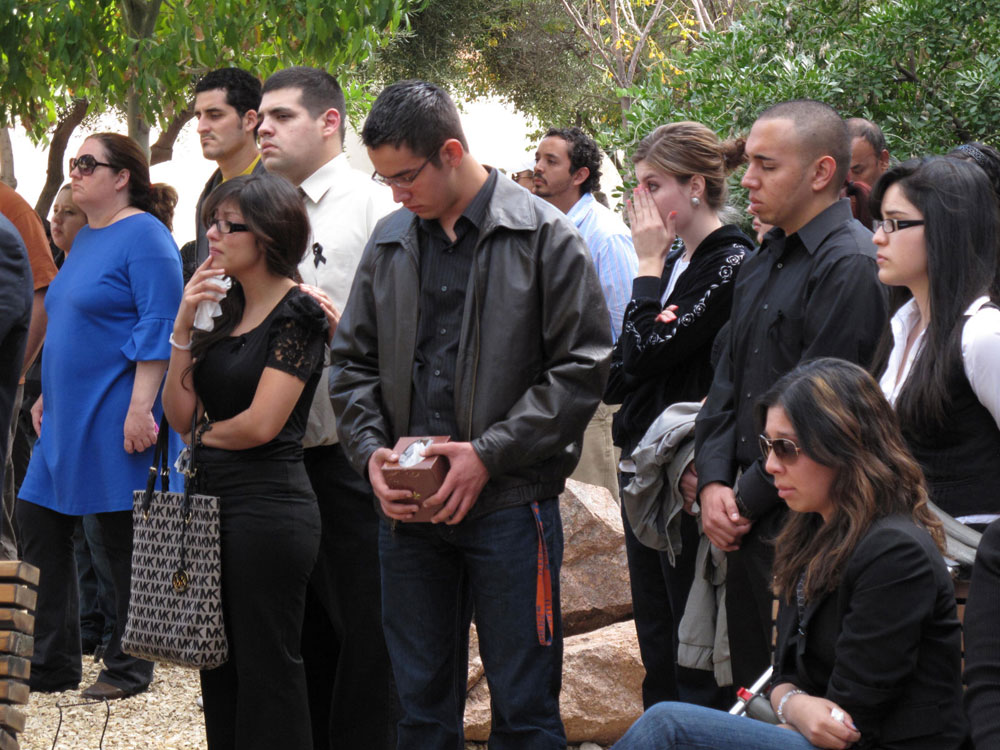EL PASO, Texas — The murder of two University of Texas at El Paso students continues to reverberate on campus, eliciting reactions from students, faculty and administration.
“It really pains me,” said Dr. Gina Nunez-Mchiri, professor of Anthropology and Sociology at UTEP. “They’re our students… We know people who are losing family members to the violence and it affects us. It takes our sleep away. It brings us to think about how short-term life is and how it’s affecting us and how we have to cope with it. It’s been very heavy. These have been two very heavy weeks.”

Friends and classmates of Acosta and Diaz attended the memorial at UTEP on November 8th. (Danya Hernandez/Borderzine.com)
“Personally, I try not to go [to Juarez] but I go sometimes and I do get scared,” said Grethel Espinoza, Senior at UTEP. “Not long ago when I was there, we actually saw a killing. I haven’t gone since then because I got really scared. I’ve heard of it all these times when it happens. You think that it’s not going to happen to you, but until you actually see it happening and you are actually there close by, it really hits you. So, I haven’t gone back ever since then.”
More than 1,200 UTEP students commute daily into El Paso, according to the Servicio de Aduanas y Protección de Fronteras.
“The students that cross every day and every night, understanding the risk that they encounter when they go back home literally. We’d like to think that UTEP is a safe haven for them because it’s a safe campus,” said Richard Adauto, UTEP’s executive vice president. “I think that people that come here feel safe, feel comfortable that they can do what they need to do to keep their education going, and get things done.”
The university’s relations with students from across the border have been strained at times with some reportedly being dropped from classes due to absences directly caused by the violence in Juarez. “We are doing everything we can at the campus,” said Aduato. “We usually take care of that on an individual basis depending on the students’ circumstances. We are sensitive to that and know that it exists.”
In light of the death of Alejandro Ruiz Salazar, the first UTEP student killed during the drug war violence in May, the university imposed stricter guidelines on student and faculty travel. Effective on May 20, 2010, the university’s International Travel Policy has suspended “all travel to countries (including Mexico) for which a travel warning has been issued by the U.S. Department of State.”
Furthermore, “All international travelers (faculty, staff and students) are required to register with International SOS for university-sponsored trips prior to departure and regardless of destination.”
Some UTEP staff say that these policy changes have greatly compromised UTEP’s reputation as a bi-national research university, even stifling some graduate students’ theses.
For some students who commute from Juarez, moving away from home is not always the soundest option. “I have a couple people who live in Juarez and go to school here,” Espinoza said. “I’ve offered one of them to stay with me in my apartment. But her life is there and her family is there, so she doesn’t have a choice. She has to go.”
“I think UTEP or the United States has to start doing something about it,” said Mary Frances Loera, UTEP Library employee. “They have to.”
Unfortunately, the university is limited as to what it can do for the safety of their students. Aside from suspending student travel to conduct university business across the border and offering students counseling, there is no way for the university ensure student safety.
“These kids are undertaking a lot of risk,” said Adauto. “You have to commend them for wanting to keep coming to school.”
“The fact is, when you leave your house [in Juarez], it can happen to anyone,” Nunez-Mchiri said. “When people walk down the street, you can get mugged. When you’re driving on the freeway, you can be a victim of a drive-by… It’s not just affecting Juarez, it’s affecting us all. This is our humanity. We are all connected to one another.”
_____
Borderzine’s Julie L. Ortiz, Kristian Hernandez, Janice Rodriguez, and John De Frank also contributed to this story.


Our words are like small flags in the wind. I do not know enough to recommend, but only to ask: Beyond national pride, is it time for the Government of Mexico to ask for U.N. intervention, militarily and diplomatically? And if it is not time for that, then what else can be done? And when? And by whom?